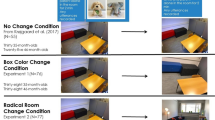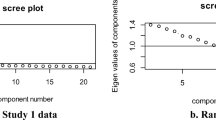Abstract
An experimental paradigm has shown that it is possible to activate spontaneous memories in children by having them re-visit the setting in which they were introduced to a memorable event. Nevertheless, the most important cues for spontaneous recall remain undetermined. In response, we investigated the importance of the experimenter by introducing 35-month-olds (n = 62) and 46-month-olds (n = 62) to the same or a new person after one week. We expected that altering the experimenter would result in fewer recollections through reducing the overlap of cues between encoding and testing. In contrast, the manipulation affected the two age groups differently: no effect of condition was seen in the 35-month-olds, whereas the 46-month-olds performed better, when the experimenter had changed, suggesting a sensitivity to change and an ability to update their knowledge of the event. We replicated previous findings demonstrating that both age groups exhibited spontaneous recollections.

Similar content being viewed by others
Notes
In Krøjgaard et al. (2017), seven dimensions were used, but in the present study we decided to omit the ‘object’ dimension because we encountered problems in identifying unambiguous criteria by which the object dimension could be coded during coder training.
Given that we failed to obtain CDI data from one participant, these analyses were based on n = 123.
References
Berntsen, D. (1998). Voluntary and involuntary access to autobiographical memory. Memory, 6, 113–141.
Berntsen, D. (2009). Involuntary autobiographical memories: An introduction to the unbidden past. Cambridge: Cambridge University Press.
Berntsen, D. (2012). Spontaneous recollections: Involuntary autobiographical memories are a basic mode of remembering. In D. Berntsen & D. C. Rubin (Eds.), Understanding autobiographical memory: Theories and approaches (pp. 290–310). Cambridge: Cambridge University Press.
Berntsen, D., Staugaard, S. R., & Sørensen, L. M. T. (2013). Why am I remembering this now? Predicting the occurrence of involuntary (spontaneous) episodic memories. Journal of Experimental Psychology: General, 142, 426–444. https://doi.org/10.1037/a0029128.
Goldenberg, E. R., & Sandhofer, C. M. (2013). Who is she? Changes in the person context affect categorization. Frontiers in Psychology, 4, 1–5. https://doi.org/10.3389/fpsyg.2013.00745.
Gopnik, A., & Graf, P. (1988). Knowing how you know: young children’s ability to identify and remember the sources of their beliefs. Child Development, 59, 98–110. https://doi.org/10.2307/1130499.
Hanna, E., & Meltzoff, A. N. (1993). Peer imitation by toddlers in laboratory, home, and day-care contexts: implications for social learning and memory. Developmental Psychology, 29(4), 701–710. https://doi.org/10.1037/0012-1649.29.4.701.
Hayne, H. (2004). Infant memory development: implications for childhood amnesia. Developmental Review, 24, 33–73. https://doi.org/10.1016/j.dr.2003.09.007.
Hintzman, D. L. (2011). Research strategy in the study of memory: fads, fallacies, and the search for the “coordinates of truth”. Perspectives on Psychological Science, 6, 253–271. https://doi.org/10.1177/1745691611406924.
Hunt, R. R., & Smith, R. E. (1996). Accessing the particular from the general: the power of distinctiveness in the context of organization. Memory & Cognition, 24, 217–225.
Johnson, M. H. (2005). Developmental cognitive neuroscience (2nd ed.). Oxford: Blackwell Publishing.
Kingo, O. S., Staugaard, S. R., & Krøjgaard, P. (2014). Three-year-olds’ memory for a person met only once at the age of 12 months: very long-term memory revealed by a late-manifesting novelty preference. Consciousness and Cognition, 24, 49–56. https://doi.org/10.1016/j.concog.2013.12.011.
Krøjgaard, P., Kingo, O. S., Dahl, J. J., & Berntsen, D. (2014). “That one makes things small”: experimentally induced spontaneous memories in 3.5-year-olds. Consciousness and Cognition, 30, 24–35. https://doi.org/10.1016/j.concog.2014.07.017.
Krøjgaard, P., Kingo, O. S., Jensen, T. S., & Berntsen, D. (2017). By-passing strategic retrieval: experimentally induced spontaneous episodic memories in 35- and 46-month-old children. Consciousness and Cognition, 55, 91–105. https://doi.org/10.1016/j.concog.2017.08.001.
Learmonth, A. E., Lamberth, R., & Rovee-Collier, C. (2005). The social context of imitation in infancy. J. Experimental Child Psychology, 91, 297–314. https://doi.org/10.1016/j.jecp.2005.02.001.
Levine, B., Svoboda, E., Hay, J. F., Winocur, G., & Moscovitch, M. (2002). Ageing and autobiographical memory: dissociating episodic from semantic retrieval. Psychology and Aging, 17, 677–689. https://doi.org/10.1037/0882-7974.17.4.677.
Nairne, J. S. (2002). The myth of the encoding-retrieval match. Memory, 10, 389–395. https://doi.org/10.1080/09658210244000216.
Nelson, K., & Ross, G. (1980). The generalities and specifics of long-term memory in infants and young children. New Directions for Child and Adolescent Development, 10, 87–101.
O’Neill, D. K., & Gopnik, A. (1991). Young children's ability to identify the sources of their beliefs. Developmental Psychology, 27(3), 390–397. https://doi.org/10.1037/0012-1649.27.3.390.
Peterson, C., Dowden, C., & Tobin, J. (1999). Interviewing preschoolers: comparisons of yes/no and wh-questions. Law and Human Behavior, 5, 539–555.
Pipe, M., & Salmon, K. (2009). Memory development and the forensic context. In M. L. Courage & N. Cowan (Eds.), The development of memory in infancy and childhood (2nd ed., pp. 241–282). Hove: Psychology Press.
Rasmussen, A. S., & Berntsen, D. (2009). The possible functions of involuntary autobiographical memories. Applied Cognitive Psychology, 23, 1137–1152. https://doi.org/10.1002/acp.1615.
Reese, E. (1999). What children say when they talk about the past. Narrative Inquiry, 9, 215–241. https://doi.org/10.1075/ni.9.2.02ree.
Sonne, T., Kingo, O. S., Berntsen, D., & Krøjgaard, P. (2019). Thirty-five-month-old children have spontaneous memories despite change of context for retrieval. Memory, 27, 38–48. https://doi.org/10.1080/09658211.2017.1363243.
Sonne, T., Kingo, O. S., & Krøjgaard, P. (2016). Empty looks or paying attention? Exploring infants’ visual behavior during encoding of an elicited imitation task. Infancy, 21, 728–750. https://doi.org/10.1111/infa.12141.
Todd, C. M., & Perlmutter, M. (1980). Reality recalled by preschool children. New Directions for Child and Adolescent Development, 10, 69–85.
Tulving, E., & Thomson, D. (1973). Encoding specificity and retrieval processes in episodic memory. Psychological Review, 80, 352–373.
Wahlheim, C. N., & Zacks, J. M. (2019). Memory guides the processing of event changes for older and younger adults. Journal of Experimental Psychology: General, 148, 30–50.
Acknowledgements
We would like to thank our student assistants for their indispensable help getting this study done. More specifically, we would like to thank Amalie Juul Harregaard, Anne Rytter Christensen, Louise Jensen, and Sarah Jakobsen for testing the participants. Yibin Zhang for preparing the data for later coding, Caroline Beyer and Mette Sørensen for coding the data and finally Emilie Kristensen for preparing data for later analysis. Most importantly, we would like to thank all of the participating children as well as their parents for bringing them to our lab and for adhering to our comprehensive instructions in this design. This study has been supported by the Danish National Research Foundation (DNRF89) and the VELUX FOUNDATION (VELUX10386).
Author information
Authors and Affiliations
Corresponding author
Ethics declarations
Conflict of interest
The authors report no conflict of interest.
Additional information
Publisher's Note
Springer Nature remains neutral with regard to jurisdictional claims in published maps and institutional affiliations.
Rights and permissions
About this article
Cite this article
Sonne, T., Kingo, O.S., Berntsen, D. et al. Noting a difference: change in social context prompts spontaneous recall in 46-month-olds, but not in 35-month-olds. Psychological Research 85, 939–950 (2021). https://doi.org/10.1007/s00426-020-01310-7
Received:
Accepted:
Published:
Issue Date:
DOI: https://doi.org/10.1007/s00426-020-01310-7




